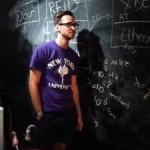Undergraduates in the Archives – Gotkin 5
February 2012
5How do you integrate archival work, logistically and practically, into your curriculum?
Kevin Gotkin
BA in Media, Culture, and Communication, Class of 2011 – NYU
PhD Student, Annenberg School for Communication – University of Pennsylvania
¶ 1 Leave a comment on paragraph 1 0 As an undergraduate I felt like the archive primed me to search for pristine differences between the past and present. It was as if the past was a foreign country I was visiting while in the archive and that I had to translate into a more modern language. Yet the evidence I worked with was rarely so easily explained on the page. Similarities across time were often differences in addition, illustrating the messiness of historiography. There was also the logistical challenge of gauging the depth of a semester-long archival project. I had the classic Goldilocks problem of finding a research question that was neither too big nor too small.
¶ 2 Leave a comment on paragraph 2 0 The added obstacle is that undergraduates rarely devote their time to academics as faithfully as graduate students and faculty do. As an undergraduate I was juggling internships, part-time jobs, and community service with my class work. Before I started my undergraduate archival work, I usually resolved the logistical tangles by relegating reading and writing to the wee morning hours. When I needed to start visiting collections around New York City, this was not so easy. I started setting aside time to commute uptown to the New York Public Library, for example, while giving myself enough time to grab lunch and get back downtown for class.
¶ 3 Leave a comment on paragraph 3 0 The challenge was manageable on a practical level, but also on a conceptual one. Undergraduates—and I include myself when I was one—tend to think that setting aside business hours for internships will help develop the practical skills necessary for landing the perfect job after graduation. And there is no denying that internships can be useful in teaching the rigors of the workplace. But when we design courses for undergraduates, requiring them to spend time actively engaged in searching and re-searching, the pace and tenor of undergraduate study changes. For me, substituting work done alone, late at night in my apartment, for the work of talking with librarians, archivists, and other experts was a far more meaningful undergraduate experience, and something that was actually easily marketable for a job interview.


0 Comments on the whole post
Leave a comment on the whole post
0 Comments on paragraph 1
Leave a comment on paragraph 1
0 Comments on paragraph 2
Leave a comment on paragraph 2
0 Comments on paragraph 3
Leave a comment on paragraph 3